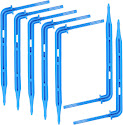Benefits of Using a Drip Irrigation System in Farming
Maximize Water Efficiency
One of the most significant advantages of drip irrigation is its ability to maximize water efficiency. Unlike traditional irrigation methods, which can waste a substantial amount of water through evaporation, runoff, and deep percolation, drip irrigation delivers water directly to the plant's root zone. This targeted approach drastically reduces water loss and ensures that plants receive the precise amount of moisture they need to thrive.
In regions where water scarcity is a pressing issue, the efficiency of drip irrigation can make a crucial difference. Farmers can maintain their crops with less water, helping to conserve this vital resource and promote sustainable agricultural practices.
Improve Crop Yield and Quality
Drip irrigation systems can significantly improve crop yield and quality. By providing consistent moisture directly to the roots, plants experience less water stress and can grow more uniformly. This even distribution of water helps to optimize nutrient uptake and promotes healthier, more robust plant growth.
Moreover, with drip irrigation, the likelihood of diseases caused by excessive moisture on the foliage is reduced. Healthier plants can produce higher-quality yields, which in turn can lead to better market prices and increased profitability for farmers.
Reduce Weed Growth
One of the often-overlooked benefits of drip irrigation is its ability to reduce weed growth. Traditional irrigation methods, such as sprinklers, wet the entire soil surface, providing ideal conditions for weeds to germinate and spread. In contrast, drip irrigation targets only the root zones of crops, leaving the surrounding soil dry and inhospitable to weeds.
By minimizing weed growth, farmers can reduce the need for herbicides and manual weeding, which can save time and reduce labor costs. This also contributes to a healthier crop environment and promotes better plant growth.
Minimize Soil Erosion and Runoff
Drip irrigation helps to minimize soil erosion and runoff, which are common issues with traditional irrigation methods. When water is applied too quickly or in large amounts, it can erode the soil and carry away valuable topsoil and nutrients. This not only depletes the soil's fertility but also contributes to water pollution.
With drip irrigation, water is applied slowly and directly to the root zone, reducing the risk of erosion and runoff. This careful application helps to maintain soil structure and health, resulting in more sustainable farming practices.
Cost-Effective in the Long Run
While the initial setup cost of a drip irrigation system can be higher compared to traditional methods, it proves to be cost-effective in the long run. The savings on water bills, reduced labor costs due to less weeding and lower pesticide use, and the potential for higher crop yields all contribute to a positive return on investment.
Furthermore, the longevity and durability of modern drip irrigation systems mean that, with proper maintenance, they can serve farmers efficiently for many years. This long-term cost-effectiveness makes drip irrigation an attractive option for sustainable and profitable farming.







Thank you for this information, will definitely look into this drip system...
ReplyDelete